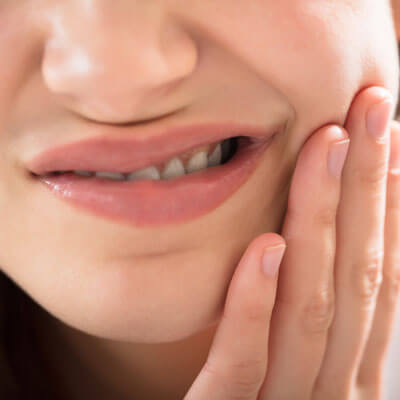Teeth Grinding & Bruxism
 Maybe you wake up with a sore jaw, headaches, or facial pain or have been told by your sleep partner that you make grating, clicking or popping sounds in your sleep – these could be signs of bruxism or teeth grinding! This common dental issue can significantly affect your oral health and overall wellbeing.
Maybe you wake up with a sore jaw, headaches, or facial pain or have been told by your sleep partner that you make grating, clicking or popping sounds in your sleep – these could be signs of bruxism or teeth grinding! This common dental issue can significantly affect your oral health and overall wellbeing.
The condition occurs when your upper and lower teeth forcefully rub against each other, causing damage that can lead to long-term problems if left untreated. Bruxism can happen while you’re awake or asleep, and its causes range from stress and anxiety to sleep disorders and cracked/ broken teeth.
Recognising the Signs and Symptoms
Early detection of bruxism is crucial to prevent further damage. Be aware of common indicators such as shortening of tooth height, waking up with tight jaw muscles, frequent migraines or headaches, and the sound of teeth grinding (often noticed by a partner or spouse).
Other signs include increased tooth sensitivity, visible wear on tooth surfaces, disrupted sleep and pain or soreness in the jaw, neck, or face. These symptoms can significantly impact your dental health and quality of life.
The Impact of on Dental Health
Bruxism exerts considerable pressure on your teeth and jaw, potentially leading to severe dental issues. Over time, this can result in cracking, fracturing and wearing down of teeth – exposing the weaker tooth substructures.
The surrounding jaw muscles and structures may also become damaged or strained, leading to difficulty or restrictions in opening the mouth (trismus), temporomandibular joint (TMJ) disorders, persistent headaches or migraines and worsening of existing periodontal (the supporting gum and bone around teeth) disease.
Treatment Options
Managing bruxism typically involves a combination of lifestyle changes and therapeutic interventions. These may include:
- Stress reduction techniques
- Use of anti-inflammatories and heat packs for symptom relief
- Custom-fitted night guards or bite splints to protect teeth
- Muscle relaxant therapy, such as neuromodulator injections
- Dental procedures to correct misaligned teeth or bite issues
- Cognitive behavioural therapy to address underlying stress or anxiety
Safeguard Your Smile
If you suspect you’re experiencing bruxism, don’t wait for the symptoms to worsen. Early intervention can prevent serious damage and improve your quality of life. Contact Alkimos Beach Dental Centre today to schedule an appointment.
Any invasive or surgical procedure may carry risks. Before moving forward, it is recommended that you seek a second opinion from an appropriately licensed medical professional.

